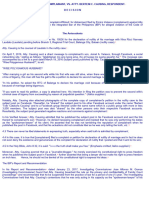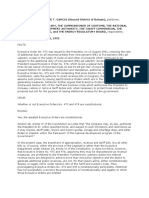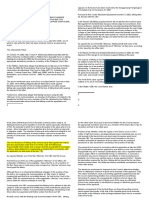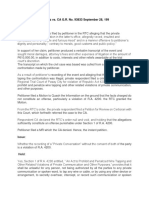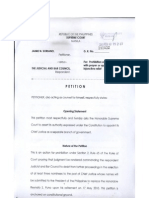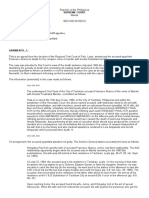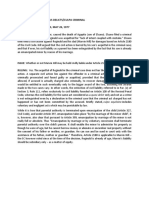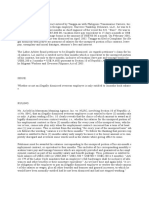0 ratings0% found this document useful (0 votes)
85 viewsNitafan Vs Cir
Nitafan Vs Cir
Uploaded by
RmLyn MclnaoThe petitioners, judges from the Regional Trial Court in Manila, sought to prohibit the Commissioner of Internal Revenue and the Supreme Court's Financial Officer from deducting income taxes from their salaries. They argued that taxing judicial salaries violates the Constitution, which states that a judge's salary cannot be decreased while in office. However, the Supreme Court ruled that the framers of the Constitution intended judicial salaries to be taxable based on discussions during its drafting. The Court found taxing salaries does not decrease them and that all citizens should equitably share the burden of income taxes.
Copyright:
© All Rights Reserved
Available Formats
Download as DOC, PDF, TXT or read online from Scribd
Nitafan Vs Cir
Nitafan Vs Cir
Uploaded by
RmLyn Mclnao0 ratings0% found this document useful (0 votes)
85 views3 pagesThe petitioners, judges from the Regional Trial Court in Manila, sought to prohibit the Commissioner of Internal Revenue and the Supreme Court's Financial Officer from deducting income taxes from their salaries. They argued that taxing judicial salaries violates the Constitution, which states that a judge's salary cannot be decreased while in office. However, the Supreme Court ruled that the framers of the Constitution intended judicial salaries to be taxable based on discussions during its drafting. The Court found taxing salaries does not decrease them and that all citizens should equitably share the burden of income taxes.
Original Description:
CASE
Original Title
Nitafan vs Cir
Copyright
© © All Rights Reserved
Available Formats
DOC, PDF, TXT or read online from Scribd
Share this document
Did you find this document useful?
Is this content inappropriate?
The petitioners, judges from the Regional Trial Court in Manila, sought to prohibit the Commissioner of Internal Revenue and the Supreme Court's Financial Officer from deducting income taxes from their salaries. They argued that taxing judicial salaries violates the Constitution, which states that a judge's salary cannot be decreased while in office. However, the Supreme Court ruled that the framers of the Constitution intended judicial salaries to be taxable based on discussions during its drafting. The Court found taxing salaries does not decrease them and that all citizens should equitably share the burden of income taxes.
Copyright:
© All Rights Reserved
Available Formats
Download as DOC, PDF, TXT or read online from Scribd
Download as doc, pdf, or txt
0 ratings0% found this document useful (0 votes)
85 views3 pagesNitafan Vs Cir
Nitafan Vs Cir
Uploaded by
RmLyn MclnaoThe petitioners, judges from the Regional Trial Court in Manila, sought to prohibit the Commissioner of Internal Revenue and the Supreme Court's Financial Officer from deducting income taxes from their salaries. They argued that taxing judicial salaries violates the Constitution, which states that a judge's salary cannot be decreased while in office. However, the Supreme Court ruled that the framers of the Constitution intended judicial salaries to be taxable based on discussions during its drafting. The Court found taxing salaries does not decrease them and that all citizens should equitably share the burden of income taxes.
Copyright:
© All Rights Reserved
Available Formats
Download as DOC, PDF, TXT or read online from Scribd
Download as doc, pdf, or txt
You are on page 1of 3
Macalinao, Romielyn P.
Subject: Constitutional Law 1
Topic: Salary
Title: NITAFAN vs CIR
Reference: 152 SCRA 284
FACTS
Petitioners, the duly appointed and qualified Judges presiding
over Branches 52, 19 and 53, respectively, of the Regional Trial
Court, National Capital Judicial Region, all with stations in Manila,
seek
to
prohibit
and/or
perpetually
enjoin
respondents,
the
Commissioner of Internal Revenue and the Financial Officer of the
Supreme Court, from making any deduction of withholding taxes
from their salaries.
In a nutshell, they submit that "any tax withheld from their
emoluments or compensation as judicial officers constitutes a
decrease or diminution of their salaries, contrary to the provision of
Section 10, Article VIII of the 1987 Constitution mandating that
"(d)uring their continuance in office, their salary shall not be
decreased," even as it is anathema to the Ideal of an independent
judiciary envisioned in and by said Constitution."
It may be pointed out that, early on, the Court had dealt with
the matter administratively in response to representations that the
Court direct its Finance Officer to discontinue the withholding of
taxes from salaries of members of the Bench. Thus, on June 4,
1987, the Court en banc had reaffirmed the Chief Justice's directive
as follows:
The Court REAFFIRMED the Chief Justice's previous and
standing directive to the Fiscal Management and Budget Office of
this Court to continue with the deduction of the withholding taxes
from the salaries of the Justices of the Supreme Court as well as
from the salaries of all other members of the judiciary.
ISSUES
Whether or not members of the Judiciary are exempt from
income taxes?
RULINGS
No, they should not be exempted. Section 10, Articles VIII, of
the 1987 Constitution, states:
The salary of the Chief Justice and of the Associate Justices of
the Supreme Court, and of judges of lower courts shall be fixed by
law. During their continuance in office, their salary shall not be
decreased.
The
debates,
interpellations
and
opinions
expressed
regarding the constitutional provision in question until it was finally
approved by the Commission disclosed that the true intent of the
framers of the 1987 Constitution, in adopting it, was to make the
salaries of members of the Judiciary taxable. The ascertainment of
that intent is but in keeping with the fundamental principle of
constitutional construction that the intent of the framers of the
organic law and of the people adopting it should be given effect.
The primary task in constitutional construction is to ascertain and
thereafter assure the realization of the purpose of the framers and
of the people in the adoption of the Constitution. it may also be
safely assumed that the people in ratifying the Constitution were
guided mainly by the explanation offered by the framers.
It is plain that the Constitution authorizes Congress to pass a
law fixing another rate of compensation of Justices and Judges but
such rate must be higher than that which they are receiving at the
time of enactment, or if lower, it would be applicable only to those
appointed after its approval. It would be a strained construction to
read into the provision an exemption from taxation in the light of
the discussion in the Constitutional Commission.
With the foregoing interpretation, and as stated heretofore,
the ruling that "the imposition of income tax upon the salary of
judges is a dimunition thereof, and so violates the Constitution" in
Perfecto vs. Meer, as affirmed in
Endencia vs. David
must be
declared discarded. The framers of the fundamental law, as the
alter ego of the people, have expressed in clear and unmistakable
terms the meaning and import of Section 10, Article VIII, of the
1987 Constitution that they have adopted Stated otherwise, we
accord due respect to the intent of the people, through the
discussions and deliberations of their representatives, in the spirit
that all citizens should bear their aliquot part of the cost of
maintaining the government and should share the burden of general
income taxation equitably.
You might also like
- Affidavit of Financial Support (Cencerita)Document1 pageAffidavit of Financial Support (Cencerita)RmLyn MclnaoNo ratings yet
- (Oliver Edwards) Access To History. The USA and TH PDFDocument177 pages(Oliver Edwards) Access To History. The USA and TH PDFAnonymous DhkVPUJW100% (2)
- Draft Ordinance (Re-Titling of Positions)Document2 pagesDraft Ordinance (Re-Titling of Positions)RmLyn MclnaoNo ratings yet
- Case Profile Report - Forensic PsychologyDocument4 pagesCase Profile Report - Forensic PsychologyGrayson100% (2)
- Nitafan v. CIRDocument2 pagesNitafan v. CIRJean Mary AutoNo ratings yet
- Nitafan V Cir 152 Scra 284Document1 pageNitafan V Cir 152 Scra 284Kris BorlonganNo ratings yet
- Nitafan vs. CIR, G.R. No. 78780, July 23, 1987 Case DigestDocument2 pagesNitafan vs. CIR, G.R. No. 78780, July 23, 1987 Case DigestlavenderstrawberryNo ratings yet
- Nitafan v. CIR GR 78780Document8 pagesNitafan v. CIR GR 78780AnonymousNo ratings yet
- Nitafan v. Cir Case DigestDocument1 pageNitafan v. Cir Case DigestNina Majica PagaduanNo ratings yet
- Songco VS NLRCDocument6 pagesSongco VS NLRCangelica poNo ratings yet
- City of Manila and Treasurer VsDocument1 pageCity of Manila and Treasurer VsPat P. MonteNo ratings yet
- De Guia Vs ComelecDocument7 pagesDe Guia Vs Comeleclucylu888No ratings yet
- CIR v. ESSO Standard 1989Document4 pagesCIR v. ESSO Standard 1989Mark Ebenezer BernardoNo ratings yet
- CIR V TMX SalesDocument12 pagesCIR V TMX SalesJolo RomanNo ratings yet
- Eugenio Vs DrilonDocument2 pagesEugenio Vs Drilonkei takiNo ratings yet
- Case Digests For SubmissionDocument18 pagesCase Digests For SubmissionAgatha GranadoNo ratings yet
- Marinduque Iron Mines v. Municipal Council of Hinabangan, SamarDocument3 pagesMarinduque Iron Mines v. Municipal Council of Hinabangan, SamarEszle Ann L. ChuaNo ratings yet
- ENRICO R. Velasco Vs Atty. BertiniDocument3 pagesENRICO R. Velasco Vs Atty. Bertiniagong lodgeNo ratings yet
- Presumption Against Unconstitutionality: ARIS (Phil.) Inc., v. National Labor Relations Commission, Et. AlDocument7 pagesPresumption Against Unconstitutionality: ARIS (Phil.) Inc., v. National Labor Relations Commission, Et. AlDaniel OngNo ratings yet
- Molina Vs RaffertyDocument18 pagesMolina Vs RaffertyShivaNo ratings yet
- Judge David Nitafan Vs Commissioner of Internal RevenueDocument1 pageJudge David Nitafan Vs Commissioner of Internal RevenueAlvin HilarioNo ratings yet
- Barangay ClearanceDocument28 pagesBarangay Clearancerosiedumas46No ratings yet
- Facts:: Facts: Commonwealth Act No. 567, Otherwise Known As Sugar Adjustment Act WasDocument2 pagesFacts:: Facts: Commonwealth Act No. 567, Otherwise Known As Sugar Adjustment Act WasRuiz Arenas AgacitaNo ratings yet
- Finman General Assurance Corp. v. CADocument4 pagesFinman General Assurance Corp. v. CAVSBNo ratings yet
- Duque vs. COMELECDocument4 pagesDuque vs. COMELECTrisha Marie SungaNo ratings yet
- Fidela Bengco Et. Al. Vs Atty Pablo S. Bernardo AC No 6368 June 13, 2012Document5 pagesFidela Bengco Et. Al. Vs Atty Pablo S. Bernardo AC No 6368 June 13, 2012BerniceAnneAseñas-ElmacoNo ratings yet
- Phil British Corp V IacDocument1 pagePhil British Corp V IacBenitez GheroldNo ratings yet
- Statutory Construction ReviewerDocument33 pagesStatutory Construction ReviewerDaphne RodriguezNo ratings yet
- Legal Ethics Review Complete Case DigestDocument11 pagesLegal Ethics Review Complete Case DigestMecah Bonita50% (2)
- Chapter 4 Stat ConDocument4 pagesChapter 4 Stat ConAngel CabanNo ratings yet
- Edillon Case DigestDocument2 pagesEdillon Case DigestBALDO, CHARITY M.No ratings yet
- De Venecia vs. Sandiganbayan (G.R. No. 130240 - February 5, 2002)Document1 pageDe Venecia vs. Sandiganbayan (G.R. No. 130240 - February 5, 2002)Lecdiee Nhojiezz Tacissea SalnackyiNo ratings yet
- ABC of Remedial LawDocument6 pagesABC of Remedial LawAbigail Talosig BarandinoNo ratings yet
- Sec 28 - 3A - Garcia V Executive SecretaryDocument1 pageSec 28 - 3A - Garcia V Executive SecretaryMaria Venus NegrosNo ratings yet
- Bengzon Vs Secretary of Justice & Insular Auditor, 62 Phil 912, G.R. No. 4282, January 18, 1936Document14 pagesBengzon Vs Secretary of Justice & Insular Auditor, 62 Phil 912, G.R. No. 4282, January 18, 1936Inday LibertyNo ratings yet
- Romulo, Mabanta, Buenaventura, Sayoc & de Los Angeles vs. Home Development Mutual FundDocument4 pagesRomulo, Mabanta, Buenaventura, Sayoc & de Los Angeles vs. Home Development Mutual FundJoanne CamacamNo ratings yet
- Perido V PeridoDocument2 pagesPerido V PeridoPNo ratings yet
- Sarmiento Vs MisonDocument2 pagesSarmiento Vs MisonJoyce Salalima BeiraNo ratings yet
- David vs. Comelec, G.R. No. 127116, 8 April 1997Document2 pagesDavid vs. Comelec, G.R. No. 127116, 8 April 1997Endora FrielleNo ratings yet
- Disqualification Bar Examinee of Meiling - Canon 7Document4 pagesDisqualification Bar Examinee of Meiling - Canon 7cha chaNo ratings yet
- Manila Railroad Company v. Insular Collector of Customs (GR 30264, 12 March 1929)Document5 pagesManila Railroad Company v. Insular Collector of Customs (GR 30264, 12 March 1929)Mark MlsNo ratings yet
- De Castro MarchDocument1 pageDe Castro MarchCristineNo ratings yet
- Tolentino vs. Secretary of Finance PDFDocument4 pagesTolentino vs. Secretary of Finance PDFJona CalibusoNo ratings yet
- Ramirez Vs CA G.R. No. 93833, September 28, 1995Document2 pagesRamirez Vs CA G.R. No. 93833, September 28, 1995melrene jalmanzarNo ratings yet
- V. Comelec, Villando v. Comelec, Biraogo v. Nograles and Limkaichong, and Paras v. Nograles, Docketed As G.RDocument48 pagesV. Comelec, Villando v. Comelec, Biraogo v. Nograles and Limkaichong, and Paras v. Nograles, Docketed As G.RzaneNo ratings yet
- Abad Santos v. United StatesDocument1 pageAbad Santos v. United StatesCatherine DimailigNo ratings yet
- GR No. 202242, Chavez v. JBC, July 17, 2012Document25 pagesGR No. 202242, Chavez v. JBC, July 17, 2012VERA FilesNo ratings yet
- The Soriano Petition (GR 191032) : de Castro vs. JBC, GR 191002, 17 March 2010Document11 pagesThe Soriano Petition (GR 191032) : de Castro vs. JBC, GR 191002, 17 March 2010Berne GuerreroNo ratings yet
- ND Edu Vs Ericta G.R. No. L-32096 October 24, 1970Document5 pagesND Edu Vs Ericta G.R. No. L-32096 October 24, 19701D OFFICIALDRIVENo ratings yet
- Interpretation and Construction of The ConstitutionDocument5 pagesInterpretation and Construction of The ConstitutionJeorge VerbaNo ratings yet
- Philconsa Vs GimenezDocument1 pagePhilconsa Vs GimenezCarlota Nicolas VillaromanNo ratings yet
- People vs. Gatchalian, 104 Phi. 664 (1958)Document1 pagePeople vs. Gatchalian, 104 Phi. 664 (1958)magichristian229No ratings yet
- People v. Abarca, 153 SCRA 735Document5 pagesPeople v. Abarca, 153 SCRA 735Emmylou Shayne LayogNo ratings yet
- Repubic Vs CA and MolinaDocument2 pagesRepubic Vs CA and MolinaivyNo ratings yet
- Case Digest - NAC Vs COADocument3 pagesCase Digest - NAC Vs COAValencia and Valencia OfficeNo ratings yet
- G.R. No. L-19650. September 29, 1966 (Case Brief - Digest)Document2 pagesG.R. No. L-19650. September 29, 1966 (Case Brief - Digest)PSWDONo ratings yet
- Miller Vs Mardo (112 Phil 792)Document7 pagesMiller Vs Mardo (112 Phil 792)Xennia Keizia FernandezNo ratings yet
- CONSTITUTIONAL COMMISSIONS-module 5Document17 pagesCONSTITUTIONAL COMMISSIONS-module 5Cecille De VeraNo ratings yet
- Consolidation 1Document11 pagesConsolidation 1NolethNo ratings yet
- Ebarle Vs SucalditoDocument2 pagesEbarle Vs SucalditoChaoSisonNo ratings yet
- Automotive Industry Workers Vs RomuloDocument1 pageAutomotive Industry Workers Vs RomuloEllen Glae DaquipilNo ratings yet
- Alta Vista Golf and Country Club v. City of Cebu, G.R. No. 180235, (January 20, 2016)Document15 pagesAlta Vista Golf and Country Club v. City of Cebu, G.R. No. 180235, (January 20, 2016)Arjay ElnasNo ratings yet
- Nitafan vs. Commissioner of Internal RevenueDocument2 pagesNitafan vs. Commissioner of Internal RevenueCourtney Tirol100% (10)
- Nitafan V CIRDocument2 pagesNitafan V CIRNathalie Jean YapNo ratings yet
- Corpo Case Digest NOTESDocument8 pagesCorpo Case Digest NOTESRmLyn MclnaoNo ratings yet
- Affidavit of Two Disinterested PersonsDocument1 pageAffidavit of Two Disinterested PersonsRmLyn MclnaoNo ratings yet
- Affidavit of Two Disinterested Persons (For Delayed Birth Cert)Document1 pageAffidavit of Two Disinterested Persons (For Delayed Birth Cert)RmLyn MclnaoNo ratings yet
- CONSOLIDATED BANK AND TRUST CORP Vs CADocument2 pagesCONSOLIDATED BANK AND TRUST CORP Vs CARmLyn MclnaoNo ratings yet
- Affidavit of Two Disinterested PersonsDocument1 pageAffidavit of Two Disinterested PersonsKarl PagzNo ratings yet
- BUSUEGO Vs CADocument2 pagesBUSUEGO Vs CARmLyn MclnaoNo ratings yet
- Affidavit of Discrepancy Baptismal Certificate Doc RHEA MAEDocument1 pageAffidavit of Discrepancy Baptismal Certificate Doc RHEA MAERmLyn MclnaoNo ratings yet
- MANALO Vs CADocument2 pagesMANALO Vs CARmLyn MclnaoNo ratings yet
- SALVACION Vs CENTRAL BANKDocument2 pagesSALVACION Vs CENTRAL BANKRmLyn Mclnao100% (1)
- Affidavit of Discrepancy Baptismal CertificateDocument1 pageAffidavit of Discrepancy Baptismal CertificateRmLyn MclnaoNo ratings yet
- Corpo Case Digest CompilationDocument16 pagesCorpo Case Digest CompilationRmLyn MclnaoNo ratings yet
- Position Paper SampleDocument2 pagesPosition Paper SampleRmLyn MclnaoNo ratings yet
- Endorsement (Atty. Orcullo)Document1 pageEndorsement (Atty. Orcullo)RmLyn MclnaoNo ratings yet
- Evidence CDsDocument73 pagesEvidence CDsRmLyn MclnaoNo ratings yet
- Palanca Vs Fred WilsonDocument1 pagePalanca Vs Fred WilsonRmLyn MclnaoNo ratings yet
- Overload LetterDocument1 pageOverload LetterRmLyn MclnaoNo ratings yet
- 01 CD Special ProceedingsDocument7 pages01 CD Special ProceedingsRmLyn MclnaoNo ratings yet
- Corporation Law DigestsDocument17 pagesCorporation Law DigestsRmLyn MclnaoNo ratings yet
- LAND TITLES - Forms&ContentsDocument27 pagesLAND TITLES - Forms&ContentsRmLyn MclnaoNo ratings yet
- Joint Affidavit (Heirs of Purita Patalinghug)Document1 pageJoint Affidavit (Heirs of Purita Patalinghug)RmLyn MclnaoNo ratings yet
- Elcano Vs HillDocument1 pageElcano Vs HillRmLyn MclnaoNo ratings yet
- JEFFREY Garrido: Position Desired: Service CrewDocument3 pagesJEFFREY Garrido: Position Desired: Service CrewRmLyn MclnaoNo ratings yet
- Roque Vs Aguado DigestDocument2 pagesRoque Vs Aguado DigestRmLyn MclnaoNo ratings yet
- Arlyn N. Umpad Sitio Sto. Nino, Quiot, Cebu City 09267715942Document3 pagesArlyn N. Umpad Sitio Sto. Nino, Quiot, Cebu City 09267715942RmLyn MclnaoNo ratings yet
- Last Kiss - : Pearl JamDocument13 pagesLast Kiss - : Pearl JamPaulo SilvaNo ratings yet
- Definition of TermsDocument8 pagesDefinition of TermssumaychengNo ratings yet
- Types of Strikes Strikes Are of Two Types, Namely: I. Primary Strikes and Ii. Secondary StrikesDocument8 pagesTypes of Strikes Strikes Are of Two Types, Namely: I. Primary Strikes and Ii. Secondary StrikesAakash GautamNo ratings yet
- A Civilised Civil ServantDocument2 pagesA Civilised Civil ServantdeepsareenNo ratings yet
- WBPIDFE Act 2013Document15 pagesWBPIDFE Act 2013ADM D MurshidabdNo ratings yet
- AQA GCSE ST Mark S GospelDocument120 pagesAQA GCSE ST Mark S Gospelnoddy60No ratings yet
- Tilly - Spaces of ContentionDocument25 pagesTilly - Spaces of Contentionsgaraujo100% (1)
- Roll 07072021Document19 pagesRoll 07072021THE INFORMATIC DOTNo ratings yet
- Art. 124 - Jose Uy and Glenda J. Uy and Gilda L. Jardeleza v. Court of Appeals and Teodoro L. JardelezaDocument2 pagesArt. 124 - Jose Uy and Glenda J. Uy and Gilda L. Jardeleza v. Court of Appeals and Teodoro L. JardelezasaminahNo ratings yet
- Đề số 4Document4 pagesĐề số 4Le HueNo ratings yet
- Re 2046 10-12 SchemesDocument20 pagesRe 2046 10-12 SchemesAkayo BeyaNo ratings yet
- Civil Law Persons & Family Relations: Ffect AND Pplication OF AWSDocument64 pagesCivil Law Persons & Family Relations: Ffect AND Pplication OF AWSJoy SamsonNo ratings yet
- The Ordinary Men An Analysis of MasculinDocument7 pagesThe Ordinary Men An Analysis of MasculinGayathri DeviNo ratings yet
- The Antecedent FactsDocument7 pagesThe Antecedent FactsAdrianNo ratings yet
- Proteina Daging Analog - Google PenelusuranDocument1 pageProteina Daging Analog - Google PenelusuranMuhammad MasbukhinNo ratings yet
- De Jesus Vs SyquiaDocument2 pagesDe Jesus Vs Syquiamerlyn gutierrezNo ratings yet
- Minority and Majority Identity Development StagesDocument2 pagesMinority and Majority Identity Development StagesNabila ShahidinNo ratings yet
- Cor 002 TG 10 27Document106 pagesCor 002 TG 10 27Mike Angelo Gare PitoNo ratings yet
- Sri Krishna Deva RayaDocument13 pagesSri Krishna Deva RayaVijay Baskar SNo ratings yet
- DG Article of AgreementDocument12 pagesDG Article of AgreementkevinmNo ratings yet
- SSU VPSAS FR 010 Membership ProfileDocument2 pagesSSU VPSAS FR 010 Membership ProfileJerson NievaNo ratings yet
- EDIFY Ebook Wokeism Runs The WorldDocument25 pagesEDIFY Ebook Wokeism Runs The WorldforcetenNo ratings yet
- Bagunu Vs Aggabao DigestDocument1 pageBagunu Vs Aggabao DigestManu Sala100% (1)
- Tangga-An v. Philippine TransmarineDocument8 pagesTangga-An v. Philippine TransmarineEcxoj MortelNo ratings yet
- To What Extent Is The Rehabilitation Process in The Prison El Buen Pastor' A Form of JusticeDocument10 pagesTo What Extent Is The Rehabilitation Process in The Prison El Buen Pastor' A Form of JusticecfajardoNo ratings yet
- BB 395 FeDocument50 pagesBB 395 Fechauhan.adv2025No ratings yet
- Pike and Shotte Samurai Army PDFDocument8 pagesPike and Shotte Samurai Army PDFKerry Wei100% (1)
- Title V and Vi Crim LawDocument165 pagesTitle V and Vi Crim LawWest Gomez JucoNo ratings yet

















